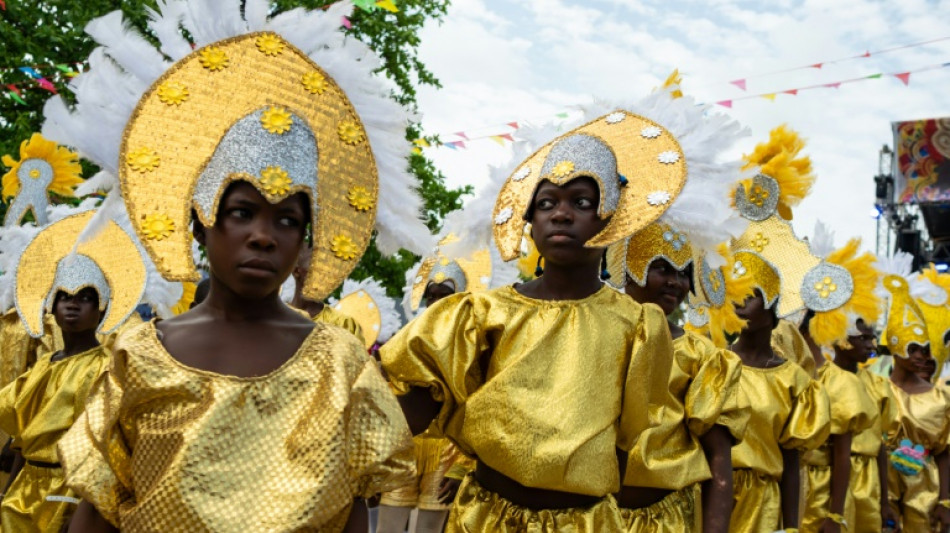
-
 Maersk suspends vessel transit through Strait of Hormuz
Maersk suspends vessel transit through Strait of Hormuz
-
France, Germany, UK ready to take 'defensive action' against Iran

-
 Knicks halt Spurs' 11-game NBA winning streak
Knicks halt Spurs' 11-game NBA winning streak
-
EU warns against long war, urges 'credible transition' in Iran

-
 Bored of peace? Trump keeps choosing war
Bored of peace? Trump keeps choosing war
-
Arteta embraces Arsenal's 'Set-Piece FC' label after corners sink Chelsea

-
 Sevilla rescue derby draw to deal Betis top four setback
Sevilla rescue derby draw to deal Betis top four setback
-
India need 'special effort' to beat England in semi-final: Gambhir

-
 'A terrible day,' says Israel community shaken by deadly Iranian strike
'A terrible day,' says Israel community shaken by deadly Iranian strike
-
Arsenal corner Chelsea into submission, Man Utd climb to third

-
 Arsenal win set-piece battle to sink Chelsea in title boost
Arsenal win set-piece battle to sink Chelsea in title boost
-
What future for Iranian leadership after Khamenei's death?

-
 'Scream 7' makes a killing at N. America box office
'Scream 7' makes a killing at N. America box office
-
Thousands stranded as Iran conflict shuts Mideast hubs
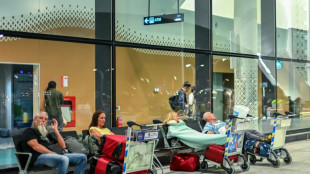
-
 Samson's 97 puts India into T20 World Cup semi-final against England
Samson's 97 puts India into T20 World Cup semi-final against England
-
Latest developments as Iran retaliates to US-Israel strikes that killed Khamenei

-
 Spurs have 'big problems' says Tudor as relegation risk persists
Spurs have 'big problems' says Tudor as relegation risk persists
-
Dortmund captain Can out for season with ACL tear

-
 Leweling doubles up as Stuttgart sink sorry Wolfsburg
Leweling doubles up as Stuttgart sink sorry Wolfsburg
-
Man Utd climb to third, Fulham sink sorry Spurs

-
 Iran strikes send VIP Dubai influencers 'back to reality'
Iran strikes send VIP Dubai influencers 'back to reality'
-
Briton Brennan bursts to Kuurne-Bruxelles-Kuurne triumph

-
 Activists pressure Milan Fashion Week to go fully fur-free
Activists pressure Milan Fashion Week to go fully fur-free
-
Blasts in Kabul as Afghan govt says responding to Pakistan attacks

-
 Iranians grieve, celebrate, worry after Khamenei's killing
Iranians grieve, celebrate, worry after Khamenei's killing
-
Latest developments as Iran lashes out after US-Israel strikes kill Khamenei
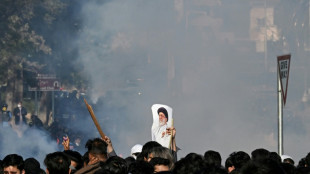
-
 West Indies post 195-4 against India in T20 World Cup do-or-die clash
West Indies post 195-4 against India in T20 World Cup do-or-die clash
-
South Africa 'embrace pressure' and favourites tag, says coach

-
 Tel Aviv residents say ready to withstand more Iranian attacks
Tel Aviv residents say ready to withstand more Iranian attacks
-
Russia loses key ally leader as Putin slams Khamenei 'cynical' killing

-
 AC Milan consolidate top-four credentials with win at Cremonese
AC Milan consolidate top-four credentials with win at Cremonese
-
Flights of fancy at Bottega Veneta, atmospheric mood at Armani in Milan
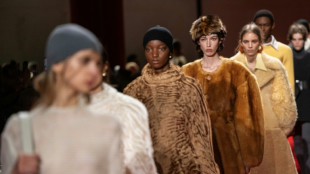
-
 Guardiola calls for respect after Ramadan break is booed
Guardiola calls for respect after Ramadan break is booed
-
Afghanistan warns Iran war will impact whole region

-
 Iran launches fresh strikes across Gulf after vowing revenge for slain leader
Iran launches fresh strikes across Gulf after vowing revenge for slain leader
-
OPEC+ hikes oil production by more than expected following outbreak of Iran war

-
 Goggia tightens grip on World Cup super-G with victory in Andorra
Goggia tightens grip on World Cup super-G with victory in Andorra
-
Belgium seizes Russian 'shadow fleet' tanker

-
 Raza steers Zimbabwe to 153-7 against South Africa
Raza steers Zimbabwe to 153-7 against South Africa
-
Kerr on target as Australia make winning start to Women's Asian Cup

-
 Marquez says 'unlucky' to retire from MotoGP season opener
Marquez says 'unlucky' to retire from MotoGP season opener
-
9 killed in pro-Iran protest at US consulate in Pakistan's Karachi

-
 Green clinches Singapore title with help from caddie husband
Green clinches Singapore title with help from caddie husband
-
More flights cancelled as Iran conflict shuts Mideast hubs

-
 'One Battle After Another' wins top producer award before Oscars
'One Battle After Another' wins top producer award before Oscars
-
Iran vows revenge for slain supreme leader despite Trump threat

-
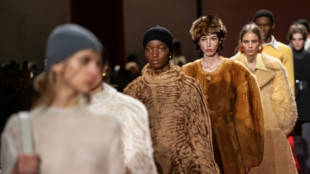 Flights of fancy at Bottega Veneta with shimmering, tactile collection
Flights of fancy at Bottega Veneta with shimmering, tactile collection
-
World Cup marks 100-day countdown amid political upheaval

-
 Bezzecchi wins MotoGP opener as Marquez retires
Bezzecchi wins MotoGP opener as Marquez retires
-
Pro-Iran protesters try to storm US missions in Pakistan, Iraq


Afro-Brazilian carnival celebrates cultural kinship in Lagos
Thousands of young and old descendants of formerly enslaved people donned elaborate costumes Sunday to bring the rhythm, vibrancy and colours of Brazil's Rio Carnival to the streets of Lagos in Nigeria.
The festival, albeit on a smaller scale than that of its Brazilian model, helps to keep their heritage alive and celebrate the city's Afro-Brazilian history.
After Brazil abolished slavery, some of those who had been enslaved returned to west Africa, settling in several countries including Nigeria and Sierra Leone.
They brought with them Latin American culture -- dance, food, religion and colours -- that lives on today in pockets of the megacity of Lagos.
At Sunday's Fanti Carnival, a stilt-walking woman in a green-and-yellow dress with a yellow fascinator on her head danced rhythmically to sounds of loud drums and trumpets, sometimes stealing a hug from a man also performing on stilts.
Just behind them, a group of young men in striking face masks were preparing for a "dragon dance" using long rubber dragons similar to those that feature in Chinese New Year celebrations.
"We want to keep (our heritage) alive, very colourful... we love colours," said retired fine art teacher Onabolu Abiola, 67, dressed in the green and yellow of the Brazilian flag.
"During this period, we don't bother ourselves with the economic situation or whatever... everybody comes together to have fun," said he added, breaking into an impromptu dance to traditional Nigerian Yoruba music.
- 'Story of hope' -
"We are here to show culture, we are here to make history -- the celebration of culture is important," said 50-year-old Mayegun Musiliu as he walked with fellow performers. "This is how we sustain it."
Brazil was the last place in the Americas to abolish slavery when it formally ended the practice in 1888.
Many slaves were forced to adopt Portuguese names, and today in Nigeria, it is common to find people with Yoruba first names and Portuguese surnames.
One of them is Aduke Gomez, a 62-year-old lawyer and historian.
"The story of Afro-Brazilians is a story of tragedy... but it's a story of hope, it's a story of resilience," she said. Loud music blaring from speakers almost drowned out her words.
"Personally, I'm very proud to be an Afro-Brazilian descendent because when you think of the chances of how many people came back and when they came back -- they came back with nothing... and many of them worked and lived to become educated and were contributing positively."
The carnival, she added, "is not just a day, it's a tangible legacy of what my ancestors went through".
- A little-known legacy -
Another participant, renowned filmmaker and actress Joke Silva, 64, recalled how her parents always used to bring her to the Fanti festival as a child.
She said she now continued the tradition, bringing her children to the celebrations.
"There needs to be more interrogation on how the trauma of (slavery)... has been part of what we are today. But that is not to claim victimhood," she said.
The carnival represents a part of Nigeria's history that is not always well known -- though some are trying to change that.
Kelenchi Anabaraonye, 27, curated a history exhibition at the festival.
"I had friends who were named Pionero, Pereira, Da Silva, Gomez," said Anabaraonye.
"Back then I thought they were jesting with the names, because you have a Yoruba first name and why are your surnames foreign? I didn't know that there was some historical connection."
Y.Nakamura--AMWN



